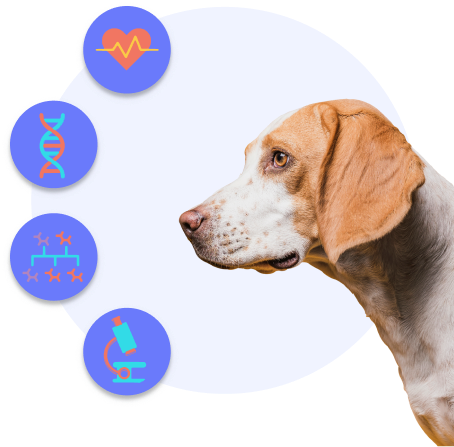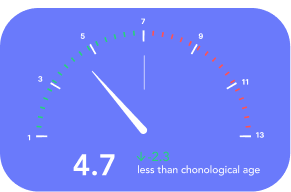Biological Age Tests for Dogs, Cats, and Companion Pets (All Mammals)
Understand their aging process. Contribute to longevity research.

Where Longevity Research Meets Community
Join the Longevity Bio-Tracking Community at MyAgingTests.com for research-grade testing, analysis and insights, to reach the goal of living longer healthier lives individually and collectively.
Powered by the Clock Foundation.
Why Should I Track My Pet's Biological Age?
Make Better Choices for Your Dog
Identify premature aging in your pets.
No two dogs age the same way. By tracking biological age you can proactively prevent aging and early death in your pet.
Breed for longer, healthier lives.
We often focus on how a dog looks or behaves. Our test can help you also consider a dog’s lifespan and health span.
Evaluate impact of diet, exercise, and lifestyle.
Many factors impact aging. We can quantify the longevity impact of diet, exercise, medicine and even supplements so you and your vet can make the best choices.
Better care for our dogs at any age.
All dogs can benefit from having their biological age measured, regardless of how old they are. whether your dog is 10 months old or 10 years old, positive lifestyle changes can always make a difference with how quickly they age.
Contribute to longevity research (for humans and pets)!
Frequently Asked Questions
Biological age refers to your age on a biological level compared to your chronological age or how many birthdays have passed for you.
Biological age tests look at changes in your biology that are indicative of biological aging. In our case, our biological age test uses what is called an epigenetic clock to calculate your biological age.
Fortunately, your biological age is modifiable, meaning you can change it. Tracking your biological age can help you see changes over time and understand the impact diet, lifestyles changes, and anti-aging treatments are having on your rate of aging.
After ordering, you’ll receive a welcome email detailing how our program works and the steps ahead.
For U.S. participants, this initial email will include:
- A link to an online survey to register your test kit and complete a brief intake questionnaire;
- A form that enables you to obtain your first blood draw, along with instructions on how to schedule an appointment; and
- Instructions on how to collect and return your at-home blood collection kit.
You will receive your initial test report including your PhenoAge results as soon as each of the above steps have been completed (within approximately 1 week). Once you receive your initial results, you’ll also be able to book a 1-on-1 consultation with our team to discuss.
Each month you’ll also receive separate notifications about our community events, where we discuss new treatments and longevity strategies.
A genetic or DNA test looks at what your DNA contains whereas an epigenetic age test measures various epigenetic changes on our DNA itself. Unlike DNA, your epigenetics are modifiable.
Many cells in the body have an “epigenetic clock” that keeps track of how quickly they are aging or, more accurately, how much damage has been done since they were created.
Our test provides your biological age as well as various key drivers of your aging.
DNA methylation is a process where methyl groups are added to DNA to influence gene expression, and which are critical for normal human development, defining cell identity, as well as for rejuvenation and reprogramming. Highly accurate estimators of chronological age have been developed are known as epigenetic aging clocks, which can predict chronological age through development and across the lifespan (Horvath 2013, Horvath & Raj 2018).
Increasingly these clocks are also being used as a measure of biological age as certain measures – most notably GrimAge (Lu 2019, Li 2020), which is able to predict future morbidity and mortality risk. GrimAge also performs well for predicting functional decline and onset of major age-related diseases, including heart disease, cancer onset, multi-modal measures of brain health, kidney disease, fatty liver, respiratory function, and more (Lu 2019, Hillary 2018, Hillary 2020, McCrory 2020). These peer reviewed and independent studies have also shown that it performs reliably across large diverse populations.
Many researchers conclude today that overall epigenetic clocks now represent the most robust measure of biological age (Li 2020, Jylhava et al 2017, Justice & Kritchevsky 2020).
Epigenetics is the study of how genes are turned off and on during an animal’s lifetime, including humans.
A Greek word meaning “above genetics”, epigenetics is the study of changes in gene function that occur without detectable changes to DNA sequence. What this means is that your gene expression (like what proteins your cells produce) changes but your gene sequences themselves do not change.
Epigenetics most often involves changes that affect gene activity and expression. These epigenetic changes can occur due to normal biological development but they can also result from external or environmental factors like food choices, stress levels or even injury.
We currently only ship to the United States, UK and Europe and serviced by labs in Los Angeles, USA, and Manchester, UK.
Please contact us if you are located elsewhere and are still interested in purchasing a test or participating in an anti-aging trial.
WARNING: TESTS INTENDED FOR RESEARCH PURPOSES ONLY
These statements have not been evaluated by the Food and Drug Administration. These products are not intended to screen, diagnose, treat, cure, or prevent any disease or condition or assess risk of any disease or condition. Unless advised by your healthcare professional, biological age should not be used to determine or alter any age-related health or medical treatments based on your chronological age.
Let’s Stay In Touch
© 2021 Clock Foundation.

